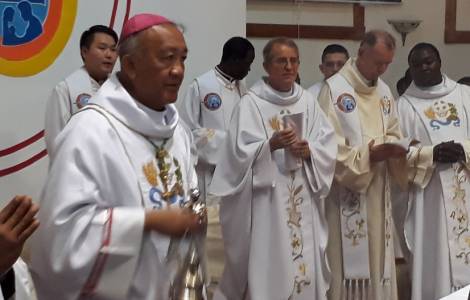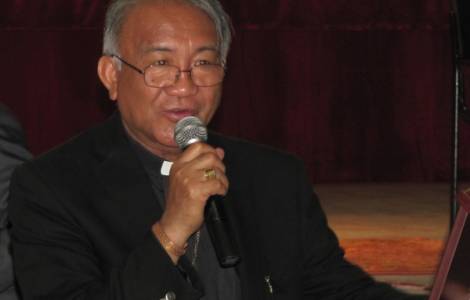
by Paolo Affatato
"The God of our fathers was truly abounding in grace and love, and he protected and guided us at every step of our journey of faith in our small community of believers in Mongolia". With these words, in 2017, on the occasion of the 25th anniversary of Mongolia's new evangelization, the then Apostolic Prefect of Mongolia, Bishop Wenceslao Padilla, a Filipino missionary of the Congregation of the Immaculate Heart of Mary (CICM), expressed his feeling of gratitude to God and all his collaborators.
Bishop Wenceslao Padilla (1949-2018) arrived in the Central Asian country in 1992 with two other Scheut missionaries. He was "a diligent worker in the Lord's vineyard," as recalled by his confrere Fr. Gilbert Sales, who began this mission with him. "He gave everything, gave himself unreservedly to the evangelizing mission in Mongolia, always entrusting himself to God and doing his utmost to initiate new pastoral and social works".
After 25 years of missionary work, Bishop Padilla was able to say with gratitude "that the Church in Mongolia is stable, with its presence in different districts, with different parishes, with socio-educational services in society". "The arrival of missionaries from different religious congregations and nations, the cooperation and faith of many Mongolians have helped build a solid Church presence in Mongolia," he affirmed. Shortly after celebrating the Church's Jubilee in Mongolia, Wenceslao Padilla died of a heart attack on September 25, 2018 in Ulaanbaatar at the age of 68. Bishop Padilla had been Superior of the "Missio sui iuris" since 1992 and had not left the country since then. The local Church (today a community of 1,300 faithful) remembers him as a person of deep faith. "He did his best by devoting himself to a foreign people in a far-off land. God used him to touch the hearts of many people in Mongolia," Father Sales recalled today.
When Mongolia became a democratic country in the early 1990s, the government in Ulaanbaatar took the initiative to establish diplomatic relations with the Holy See and asked Catholic missionaries to come to the country. Diplomatic relations were officially established on April 4, 1992, and the first group of missionaries, three members of the Congregation of the Immaculate Heart of Mary (CICM), arrived in Mongolia on July 10, 1992. The first missionaries were Father Wenceslao Padilla, Father Robert Goessens and Father Gilbert Sales.
Wenceslao Padilla was born on September 28, 1949 in Tubao (Philippines). He was ordained a priest on March 17, 1976. When he arrived with two of his confreres, there were no native Catholics in Mongolia. However, the missionaries learned that among the staff of foreign embassies there were some Catholics living in Mongolia. Thus began the prayer meetings in the private homes and the celebration of Sunday Mass in the homes of the missionaries. As the number of participants grew, rooms were rented for the celebration of Sunday Mass. Only years later did the construction of brick churches begin.
Thanks to the pastoral work of Bishop Padilla and the first priests, the "little flock" of the Church in Mongolia was reborn, a community close to the poor, committed to education and in dialogue with other cultures and religions. From the beginning, the Catholic community has maintained a respectful attitude towards local cultures, developing good relations with other religions while providing services and social support to many disadvantaged, poor and marginalized people.
The territory entrusted to Bishop Padilla included all of Mongolia: two and a half million people. Ten years after his arrival in 2002, he was appointed Prefect Apostolic of Mongolia. His episcopal ordination took place on August 29, 2003 in the Cathedral of Saints Peter and Paul in Ulaanbaatar, which he himself oversaw. At his episcopal ordination in 2003, Bishop Padilla said: "The priority is to maintain good relations with all people without discrimination and to testify to the love of Christ to Buddhists, other Christians, Muslims and all people in Mongolia." From the beginning, Bishop Padilla won the hearts of the Mongolian people and was very popular with Russian Orthodox Christians, Buddhists, shamans and members of non-Christian denominations.
As Bishop, he campaigned for raising the level of education, from kindergarten to university: "We supported pupils and students so that they could go abroad and graduate from a foreign university, but I wish that our young people can get a good education here in their own country", he said.
During the 26 years of his service in the local Church, the bishop had tried with foresight to invite as many religious and missionary communities as possible to settle in Mongolia in order to "give the local Church a plural face with the richness of its various charisms".
So many missionaries from Africa, Asia, Europe and Latin America came to Mongolia. They have launched technical schools, orphanages, retirement homes, clinics, domestic violence shelters and kindergartens. Often located in suburban areas where basic services are lacking, these centers are used by poor people and children from poor families.
In reviewing the history of the local Church in Mongolia, the bishop explained the criteria
followed: sowing the Gospel, working for the common good, fighting poverty, contributing to the human, cultural, moral and spiritual development of the country. In 2006, there were about 600 Catholics in Mongolia, including 350 Mongolian aborigines. After 20 years of evangelization there were 835, and in 2008 two young Mongolian men entered the seminary to train for the priesthood and later become a priest.
Various pastoral, social, educational, charitable and humanitarian organizations have been established over the years, including two houses for street children, a home for the elderly, two Montessori kindergartens, two primary schools, a center for disabled children, a technical school. Three libraries with study rooms and computers were set up, a dormitory for university students with modern facilities and various centers for youth activities. Thanks to the bishop's push, two rural farms were established with programs to support rural communities, a health station and a clinic, and "Caritas Mongolia", founded by Padilla, runs programs on water supply, building houses for the needy, sustainable agriculture, on food security, social empowerment and combating human trafficking.
When he spoke about the history of the Church in Mongolia, Padilla liked to speak of a "rebirth". "When the three of us arrived here in 1992," Padilla told Fides, "we never thought of 'planting the Church' from scratch, but we believed in bringing back the proclamation of Christ to this land, convinced that the Lord has always been close to the Mongolian people, who welcomed the Gospel again with faith and hope. We were 'collaborators with the Most High' in establishing his kingdom among the Mongolian people". One symbolic event is particularly fondly remembered in Mongolia: in 2017, as every year, the Mongolians celebrated the "Tsagaan Sar" festival, one of the oldest and most important festivals in Mongolian culture, which literally means "White Moon" and is rich in symbolism and rituals that take place in families. The Mongolian population celebrates it at the same time as the Lunar New Year, and the Catholic Church has integrated the festival into the liturgy: In the Catholic Churches of Mongolia, a special Eucharist is celebrated at the beginning of the New Year to entrust the lives of all people to God and pray for the nation. In 2017, however, the New Year celebrations coincided with the start of Lent and Ash Wednesday, a day of penitence. For this reason, Bishop Padilla postponed the imposition of the ashes until the first Sunday of Lent and granted an "extraordinary exemption from fasting and Lenten abstinence" because Mongolian families traditionally consume large amounts of meat during the feast days. The Mongolian faithful, who flocked to church in the morning, appreciated this type of inculturation and the fact that the Catholic liturgy could be reconciled with local traditions. The bishop quoted Paul's first letter to the Corinthians: "Although I am free in regard to all, I have made myself a slave to all so as to win over as many as possible. To the Jews I became like a Jew to win over Jews; to those under the law I became like one under the law - though I myself am not under the law - to win over those under the law.To those outside the law I became like one outside the law - though I am not outside God's law but within the law of Christ - to win over those outside the law.To the weak I became weak, to win over the weak. I have become all things to all, to save at least some. All this I do for the sake of the gospel, so that I too may have a share in it" (1 Cor 9, 19-23).
Bishop Padilla was buried in Ulaanbaatar on October 14, 2018. In his homily at the funeral, Archbishop Alfred Xuereb, then Apostolic Nuncio to South Korea and Mongolia, praised the prelate's "love, humility and commitment". Echoing the Gospel read on that occasion, the Nuncio said: "The Lord is pleased with the work done by Bishop Wenceslao Padilla in Mongolia and says to him: 'Well done, my good and faithful servant. Come, share your master's joy." (Mt 25:23).
The affection of the Mongolian faithful was expressed on a banner in the cathedral that read: "Dear beloved Bishop Wens, your life will always be in our hearts. You have been a living example of faith and charity for everyone you have met. Until your death you were kind and cheerful. It is painful to lose you now, but God knows best. We wish you to be safe in the bosom of our Heavenly Father". (Agenzia Fides, 15/7/2023)
